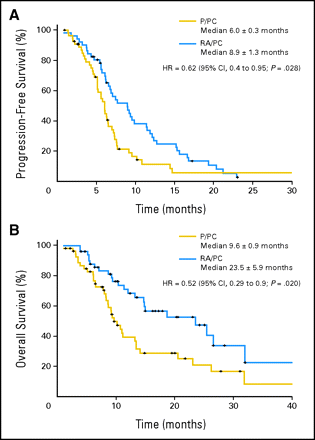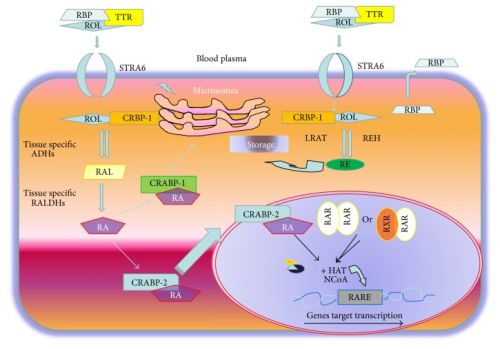16 augustus 2015: U kunt het volledige studierapport: Randomized Phase II Trial of All-Trans-Retinoic Acid With Chemotherapy Based on Paclitaxel and Cisplatin As First-Line Treatment in Patients With Advanced Non–Small-Cell Lung Cancer gratis inzien.
Met een hele duidelijke verbetering van de ziektevrije tijd en vermindering van de bijwerkingen. Hoe zou dat uitpakken zonder chemo denk ik dan? Of met arseentrioxide (ATO), zoals bij leukemie heel goed uitpakt. Hier de grafiek bij longkanker naast chemo:

Maar lees ook eens dit studierapport: Vitamin A, Cancer Treatment and Prevention: The New Role of Cellular Retinol Binding Proteins over de rol van vitamine A in het ontstaan en/of preventie van kanker. Bijzonder interessant voor artsen en wetenschappers denk ik. Abstract van deze studie staat ook onderaan artikel.
10 december 2012:
All-trans-retinoic acid ( ATRA) en arseentrioxide (ATO) samen zorgt bij APL - Acute Promyelocitische Leukemie voor nagenoeg volledige genezing (98,5%) zonder gebruik te maken van chemo. Het bijzondere aan die studie is dat kankercellen door ATRA worden getransformeerd tot gewone gezonde cellen en niet worden gedood door welk middel dan ook. Lees ook die studie eens, klik hier, en is hoewel alleen nog bewezen bij leukemie toch ook interessant als aanvulling op onderstaand artikel van ATRA bij longkanker.
26 juli 2010: Journal of Clinical Oncology, Vol 28, No 21 (July 20), 2010: pp. 3463-3471
Atra - All-trans-retinoic Acid (een vorm van vitamine A) wordt gegeven naast chemo aan longkankerpatienten met pleurale niet-kleincelliige longkanker (stadium IIIB en IV) dan geeft dat een significant langere ziektevrije tijd en levensduur. Dit blijkt uit een gerandomiseerde fase II studie bij 104 longkankerpatienten waarbij elke groep wel chemo kreeg maar 1 groep een placebo als toevoeging en de andere groep dus de Atra - All-trans-Retinoic Acid. Het verschil in progressievrije tijd bleek significant beter voor de Atra groep: (hazard ratio, 0.62; 95% CI, 0.4 to 0.95). Ook de responserate, het aanslaan van de behandeling verdubbelde in de Atra groep t.o.v. de alleen chemogroep. Overigens wordt Atra - All-trans-retinoic Acid ook veel en succesvol gebruikt voor kinderen met leukemie.
Hier het abstract van de studie:
the combination of ATRA with the standard CT regimen is a safe and potentially useful treatment for NSCLC in terms of response rate (RR) and progression-free survival (PFS)
- © 2010 by American Society of Clinical Oncology
Randomized Phase II Trial of All-Trans-Retinoic Acid With Chemotherapy Based on Paclitaxel and Cisplatin As First-Line Treatment in Patients With Advanced Non–Small-Cell Lung Cancer
- Oscar Arrieta,
- Claudia H. González-De la Rosa,
- Elena Aréchaga-Ocampo,
- Geraldine Villanueva-Rodríguez,
- Tania L. Cerón-Lizárraga,
- Luis Martínez-Barrera,
- María E. Vázquez-Manríquez,
- Miguel Ángel Ríos-Trejo,
- Miguel Á. Álvarez-Avitia,
- Norma Hernández-Pedro,
- Carlos Rojas-Marín and
- Jaime De la Garza
+ Author Affiliations
- Corresponding author: Oscar Arrieta, MD, Department of Medical Oncology, Instituto Nacional de Cancerología, San Fernando #22, Col Sección XVI, Tlalpan, 14080 México, DF, México; e-mail: ogar@servidor.unam.mx.
-
Presented in part at the Annual Meeting on Molecular Markers in Cancer of the American Society of Clinical Oncology-National Cancer Institute-European Organisation for the Research and Treatment of Cancer, October 30-November 1, 2008, Hollywood, FL; at the 13th World Conference on Lung Cancer, International Association for the Study of Lung Cancer, July 31-August 4, 2009, San Francisco, CA; and at the ECCO 15 34th ESMO Multidisciplinary Congress, September 20-24, 2009, Berlin, Germany.
Abstract
Purpose This randomized phase II trial evaluated whether the combination of cisplatin and paclitaxel (PC) plus all-trans retinoic acid (ATRA) increases response rate (RR) and progression-free survival (PFS) in patients with advanced non–small-cell lung cancer (NSCLC) with an acceptable toxicity profile and its association with the expression of retinoic acid receptor beta 2 (RAR-β2) as a response biomarker.
Patients and Methods Patients with stages IIIB with pleural effusion and IV NSCLC were included to receive PC, and randomly assigned to receive ATRA 20 mg/m2/d (RA/PC) or placebo (P/PC) 1 week before treatment until two cycles were completed. RAR-β2 expression was analyzed in tumor and adjacent lung tissue.
Results One hundred seven patients were included, 55 in the P/PC group and 52 in the RA/PC group. RR for RA/PC was 55.8% (95% CI, 46.6% to 64.9%) and for P/PC, 25.4% (95% CI, 21.3 to 29.5%; P = .001). The RA/PC group had a longer median PFS (8.9 v 6.0 months; P = .008). Multivariate analysis of PFS showed significant differences for the RA/PC group (hazard ratio, 0.62; 95% CI, 0.4 to 0.95). No significant differences in toxicity grade 3/4 were found between groups, except for hypertriglyceridemia (10% v 0%) in RA/PC (P = .05). Immunohistochemistry and reverse-transcriptase polymerase chain reaction assays showed expression of RAR-β2 in normal tissues of all tumor samples, but only 10% of samples in the tumor tissue.
Conclusion Adding ATRA to chemotherapy could increase RR and PFS in patients with advanced NSCLC with an acceptable toxicity profile. A phase III clinical trial is warranted to confirm these findings.
Vitamin A, Cancer Treatment and Prevention: The New Role of Cellular Retinol Binding Proteins
Vitamin A, Cancer Treatment and Prevention: The New Role of Cellular Retinol Binding Proteins
Abstract
Retinol and vitamin A derivatives influence cell differentiation, proliferation, and apoptosis and play an important physiologic role in a wide range of biological processes. Retinol is obtained from foods of animal origin. Retinol derivatives are fundamental for vision, while retinoic acid is essential for skin and bone growth. Intracellular retinoid bioavailability is regulated by the presence of specific cytoplasmic retinol and retinoic acid binding proteins (CRBPs and CRABPs). CRBP-1, the most diffuse CRBP isoform, is a small 15 KDa cytosolic protein widely expressed and evolutionarily conserved in many tissues. CRBP-1 acts as chaperone and regulates the uptake, subsequent esterification, and bioavailability of retinol. CRBP-1 plays a major role in wound healing and arterial tissue remodelling processes. In the last years, the role of CRBP-1-related retinoid signalling during cancer progression became object of several studies. CRBP-1 downregulation associates with a more malignant phenotype in breast, ovarian, and nasopharyngeal cancers. Reexpression of CRBP-1 increased retinol sensitivity and reduced viability of ovarian cancer cells in vitro. Further studies are needed to explore new therapeutic strategies aimed at restoring CRBP-1-mediated intracellular retinol trafficking and the meaning of CRBP-1 expression in cancer patients' screening for a more personalized and efficacy retinoid therapy.
Gerelateerde artikelen
- All-Trans-Retinoic Acid - (Atra is een vorm van vitamine A) gegeven naast chemo bij niet-klein-cellige longkanker zorgt voor significant langere levensduur. aldus gerandomiseerde fase II studie.
- Antioxidanten - vitamines bewijzen levensverlengende effect - verdubbeling van levensduur van 2 jaar naar 4,3 jaar - bij niet-klein-cellige longkanker en verbeteren aanzienlijk kwaliteit van leven
- Acetylcysteine (Glutathion) toegevoegd aan prednison en azathioprine zorgt voor significant beter effect bij idiopathische longfibrose en significant betere kwaliteit van leven blijkt uit dubbelblinde ge
- Astragalus polysaccharide injectie aanvullend op chemo (vinorelbine en cisplatin) verbetert significant kwaliteit van leven en verlengt levensduur bij patienten met gevorderde niet-klein-cellige longkanker
- Bexarotene - een bewerkte vorm van vitamine A - gegeven naast Tarceva - erlotinib geeft betere kwaliteit van leven en betere overleving bij spijsverteringskanker met uitzaaiïngen in de longen.
- Broccoli voorkomt longkanker blijkt uit studie gepubliceerd in The Lancet
- Chinese kruiden mix - injecties met Kanglaite bv. - naast chemo geeft significant betere tweejaars en driejaars overlevingscijfers en superieure kwaliteit van leven dan alleen chemo bij niet-klein-cellige longkanker
- Hydrazine sulfaat vermindert significant bijwerkingen naast chemococktail en verlengt significant mediane levensduur met 40 procent bij niet-klein-cellgie longkankerpatiënten aldus gerandomiseerde studie fase III studie
- Melatonine geeft op 5-jaars meting 25 procent meer ziektevrije overleving bij patienten met operabele niet-kleincellige longkanker stadium III/IV in vergelijking met placebo copy 1
- Melatonine naast chemo geeft significant meer vijf jaars overlevingen bij longkanker en betere kwaliteit van leven dan alleen een behandeling met chemo.
- OK-432 zorgt in vergelijking met chemo voor langere ziektevrije overleving en overall overleving bij niet vooaf behandelde longkanker met uitzaaiingen in het longvocht.
- Polysaccharide K en Coriolus versicolor extracten blijken effectieve aanpak al of niet aanvullend op andere behandelingen voor longkanker blijkt uit grote reviewstudie
- Visolie verbetert significant responskans van chemo en visolie geeft naast chemo significant mediaan langere overleving bij niet-klein-cellige longkanker
- Zilvernitraat gaat minstens net zo goed als talk long- en borstvliesproblemen ( ontstekingen/vocht) tegen. Talk is al superieur aan de chemo doxorubicine en nu lijkt zilvernitraat nog effectiever dan talk.
- Voeding en voedingsupplementen bij longkanker: een overzicht van belangrijke studies en recente ontwikkelingen. Artikel update 15 april 2010




Plaats een reactie ...
Reageer op "All-Trans-Retinoic Acid - (Atra is een vorm van vitamine A) gegeven naast chemo bij niet-klein-cellige longkanker zorgt voor significant langere levensduur. aldus gerandomiseerde fase II studie."